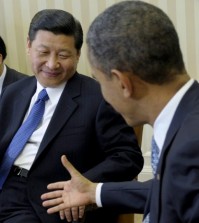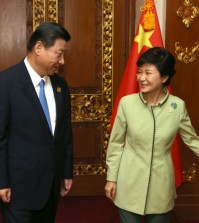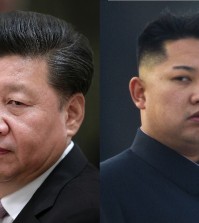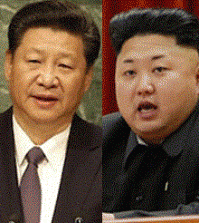- California Assembly OKs highest minimum wage in nation
- S. Korea unveils first graphic cigarette warnings
- US joins with South Korea, Japan in bid to deter North Korea
- LPGA golfer Chun In-gee finally back in action
- S. Korea won’t be top seed in final World Cup qualification round
- US men’s soccer misses 2nd straight Olympics
- US back on track in qualifying with 4-0 win over Guatemala
- High-intensity workout injuries spawn cottage industry
- CDC expands range of Zika mosquitoes into parts of Northeast
- Who knew? ‘The Walking Dead’ is helping families connect
S. Korea-U.S. ties face Xi factor
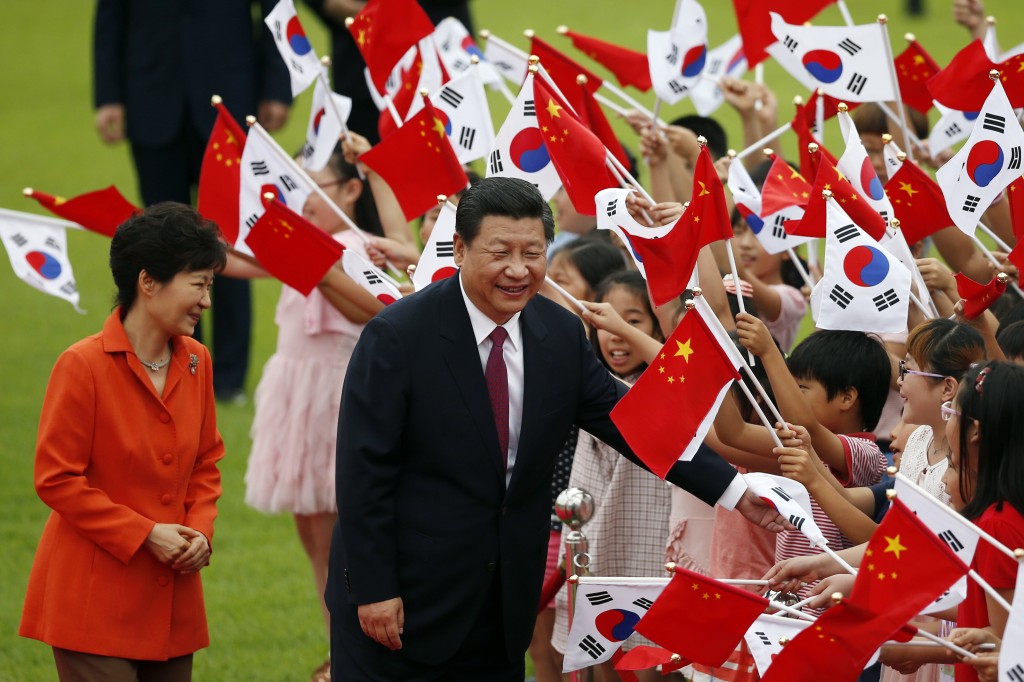
Chinese President Xi Jinping (C) and South Korean president Park Geun-hye (L) greets children waving the two national flags during a welcoming ceremony at the presidential Blue House in Seoul July 3, 2014. (AP Photo/Kim Hong-ji, Pool)
By Kang Seung-woo
The recent visit by Chinese President Xi Jinping to Korea triggered a number of changes to the ROK-U.S. alliance and Beijing-Pyongyang ties, experts say.
Xi stood firm with President Park Geun-hye against Japan’s recent moves to deny historical truths and return to militarism — which the U.S. government doesn’t want to happen.
Furthermore, the two state leaders touched on North Korea issues, which were avoided by China as well.
Xi wrapped up his two-day state visit to Seoul on Friday during which he held a summit with Park.
“Since South Korea and China established diplomatic relations in 1992, the two nations are on the best terms with each other while relations between China and North Korea are probably at their worst ever,” said Kim Youl-soo, a professor at Sungshin Women’s University.
He said the North’s purge of pro-China Jang Song-thaek as well as its repeated nuclear test has worsened their long-standing ties.
“China wants controllable North Korea. In addition, North Korea hinted Jang was executed due to his conspiracy connection with China to overthrow the secretive regime, which further angered the Chinese leadership.”
As a result, China joined the U.S.-led United Nations Security Council’s expanded sanctions on the North last year.
“Xi’s visit to Korea set a new milestone for the future development of bilateral relations,” Chinese Foreign Minister Wang Yi said in a statement.
Wang even compared Xi’s visit to a “drop-in among relatives.”
“Xi greatly enriched the content of the China-Korea strategic cooperative partnership and charted a new course for the future development of the bilateral ties,” he said.
During a special luncheon on Xi’s last day of the trip, the two leaders shared concerns over Japan’s right-wing shift.
The Japanese Cabinet is poised to approve a landmark change in security policies, paving the way for its military to fight overseas, while it also reviewed the Kono Statement — the official sexual slavery apology.
“Park and Xi agreed that it is worrying that Japan’s attitude toward revising history continues even as it seeks to expand its right to self-defense,” Ju Chul-ki, the senior presidential secretary for foreign affairs, said. He added that they urged the Shinzo Abe Cabinet to stick to the pacifist Constitution.
It is rare for Seoul to express dissent together with China over Tokyo’s push to exercise the right toward collective self-defense, with Washington backing the drive as part of a move to contain Beijing. Korea and Japan are the major allies to the United States in Northeast Asia, with some 28,500 American troops stationed here against North Korea, and the Barack Obama administration is stressing trilateral cooperation against a rising China.
In response to Park’s “unexpected” decision, Xi also took issue with Pyongyang’s nuclear program, suggesting relations between China and North Korea are shifting.
Last week, Japan officially decided to lift its sanctions on North Korea for pursuing a nuclear program in return for the latter’s investigation into the fate of Japanese nationals abducted by the North decades ago.
“The two sides recognized the humanitarian nature of the issue, should it be mishandled, the international coordination over the North’s nuclear weapons can be shaken,” Ju said.
Xi decided to come to Seoul ahead of Pyongyang, Beijing’s oldest ally, for the first time in more than two decades. Diplomatic sources said the visit was a “clear rebuff to North Korean leader Kim Jong-un.”
“The conditions were right between Seoul and Beijing, so Xi picked the South over the North,” Kim said.
In addition, they reached consensus Thursday to develop a mature “strategic partnership for cooperation” in a joint statement, under which the two leaders will have their chief security officers as well as foreign ministers meet on a regular basis.
In non-political areas, the two nations became closer through the Xi visit.
Chinese first lady Peng Liyuan made headlines during her stay in Korea, drawing more attention — from the public as well as the media — than her husband and Xi presented a pair of pandas to Park as a gift of friendship.
In addition, Park also received a scroll with ancient Chinese general Zhao Yun on it, whom she described as her “first love” in her autobiography. Zhao is a central character in the “Romance of the Three Kingdoms,” a classic Chinese historical saga dealing with the power struggles of ancient Chinese warlords.








